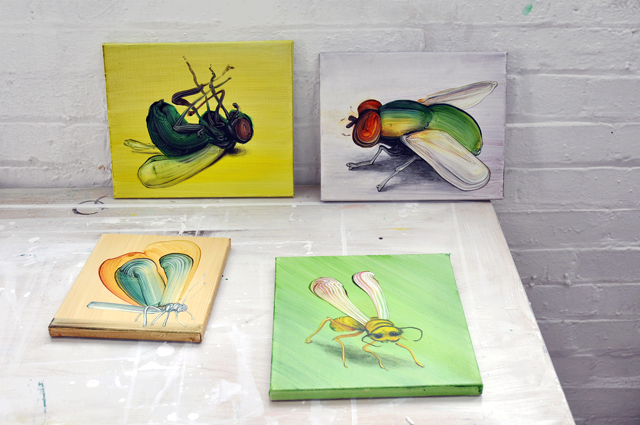PETER FREITAG

Mimei Thompson
London, UK
...Page is loading...

London, UK
Mimei’s paintings are both process-based and representational. The works are constructed in thin translucent layers over a smooth white ground. Paint marks function descriptively, but their physicality, as paint and as trace of gesture, remains strong.
There is a preoccupation with the everyday made strange, radiant, or poetic. The subject matter is often the humble or overlooked, such as weeds, insects, an overgrown urban...
Mimei’s paintings are both process-based and representational. The works are constructed in thin translucent layers over a smooth white ground. Paint marks function descriptively, but their physicality, as paint and as trace of gesture, remains strong.
There is a preoccupation with the everyday made strange, radiant, or poetic. The subject matter is often the humble or overlooked, such as weeds, insects, an overgrown urban corner or a spilling bag of rubbish.
The world in the paintings has a sense of fluidity, and a commonality, where everything is made of the same substance. There is a feeling that matter is temporarily taking on certain forms, but these could be transient and capable of morphing.
‘Nature’, a broadly interpreted theme in the work, stands in for a site of authenticity, searched for but knowingly unattainable. In making the work there is a drive to connect to a place of origin, coupled with a knowingness of the impossibility of satisfying this desire.
What is it about your studio space that inspires you?
There is a lot of light, which helps, living in a climate that can be quite grey, and there are a number of good artists in the same studio building.
What sounds, scents and sights do you encounter while in your studio?
My dog often comes with me to the studio, and sleeps on the most confortable chair. I like to keep the space as clear as possible (not always easy), as I find it easier to work when there is less clutter and visual noise.
What is your favourite material to work with? How has your use of it evolved throughout your practice?
I originally trained as a photographer, for my undergraduate degree, but moved into painting as it was for me more immediately connected to the senses.
If you could install your art absolutely anywhere, where would that be?
Inverleith House in the Botanic Gardens in Edinburgh
If you weren´t an artist, what would you be doing?
I would have liked to work in the field of alternative and sustainable energy
What are your favourite places besides your studio?
Under the sea